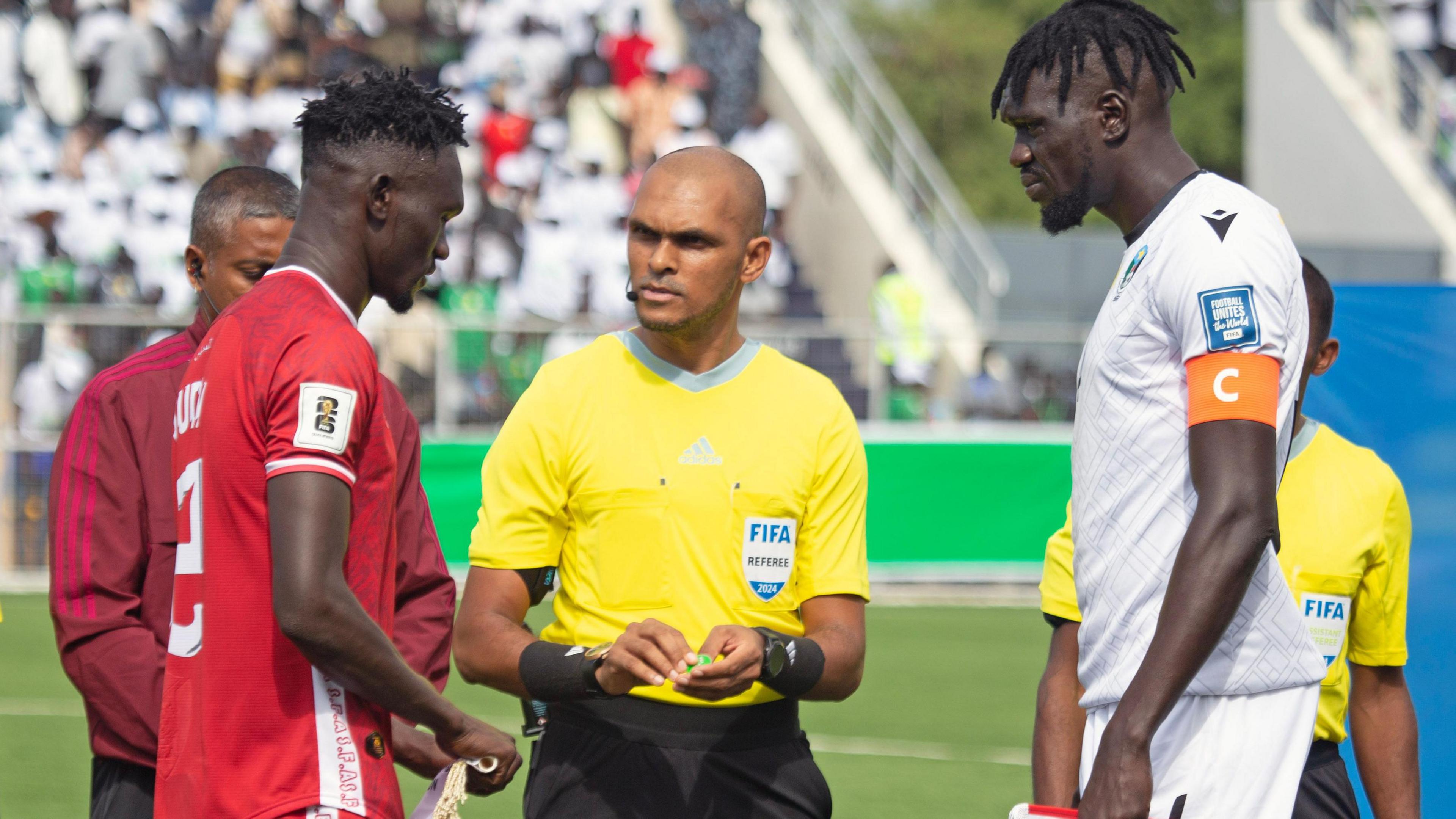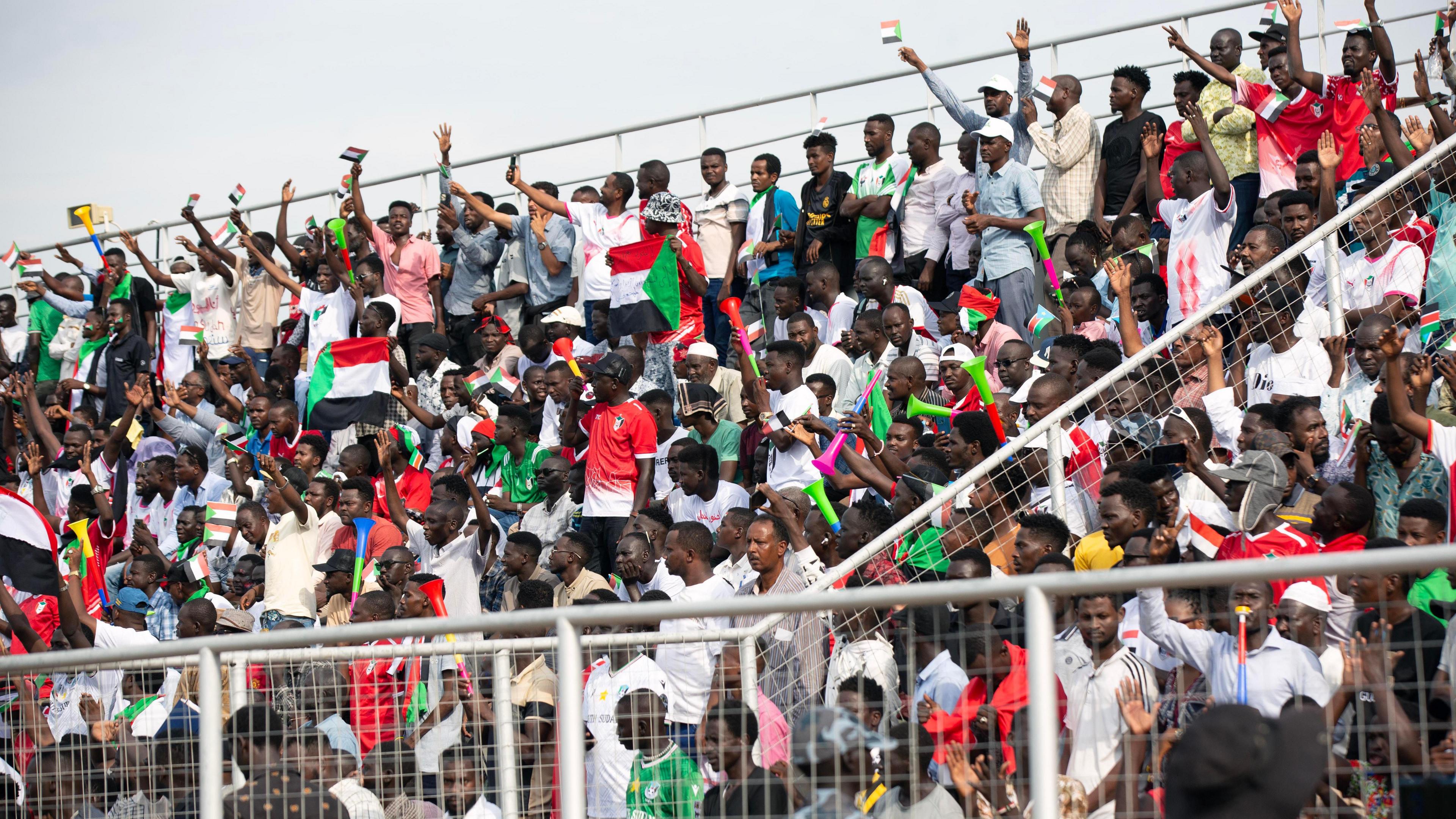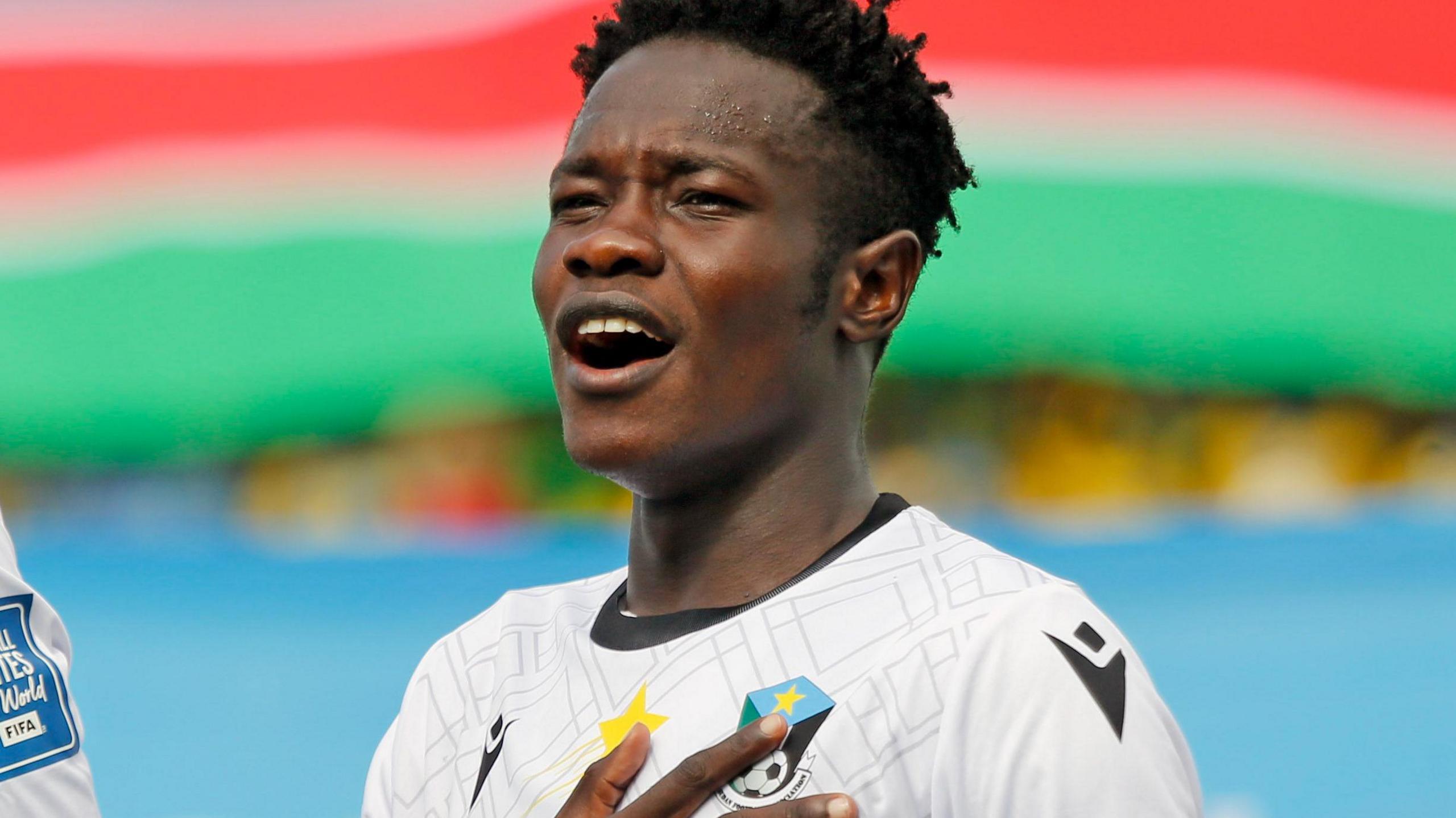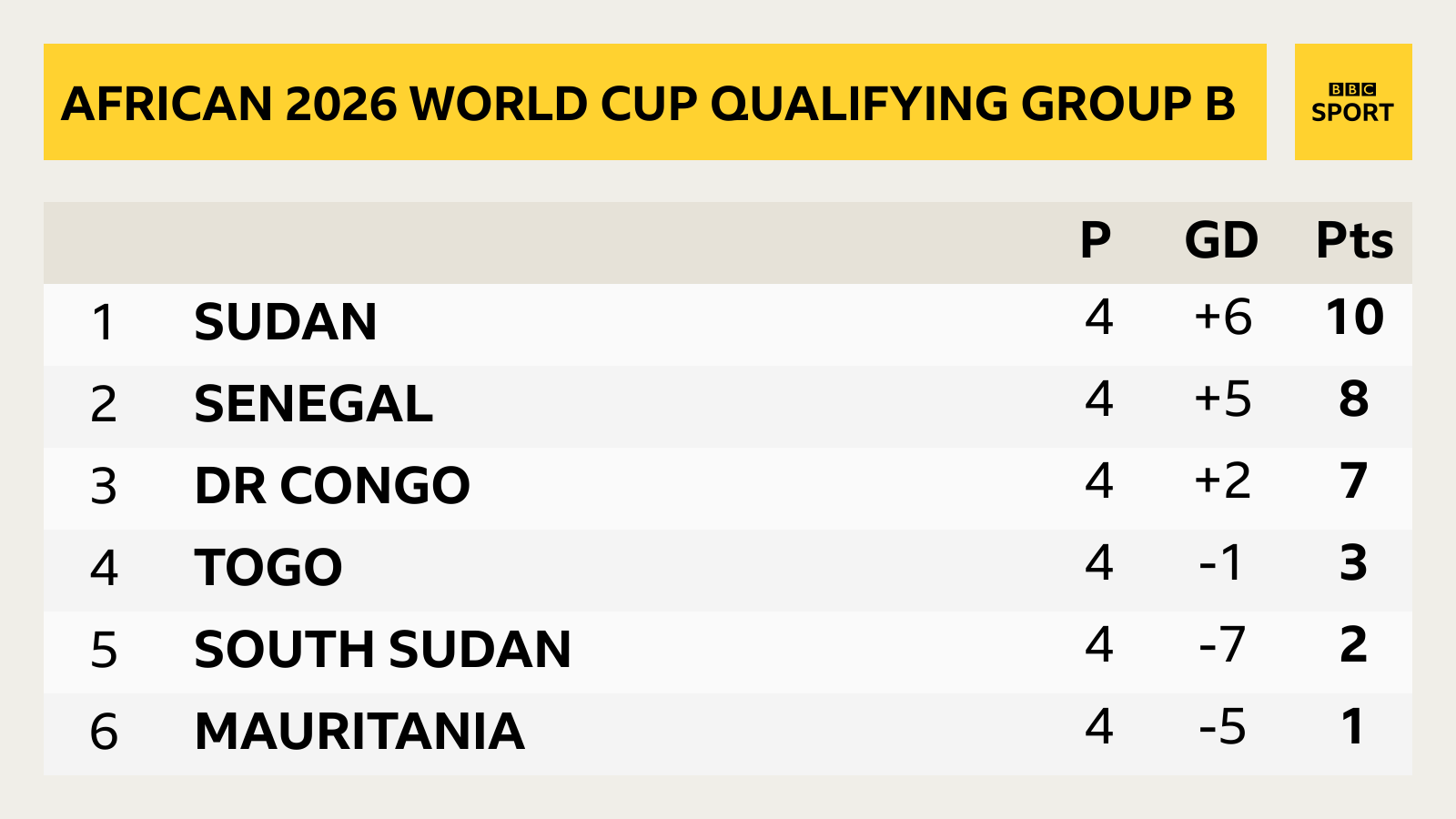Why South Sudan fans sang Sudan's national anthem

Sudan, captained by Bakhit Khamis (left, in red strip), beat neighbours South Sudan in the first game at the new national stadium in Juba but still won the support of the home crowd
- Published
In the midst of a civil war that has been raging for more than a year, Sudan's footballers continue to offer a ray of light – and the sport's power to unite was on full display in Juba this week.
There were emotional scenes when Sudan's national side travelled to the capital of South Sudan, a country which was once at war with its northern neighbour before gaining independence.
That was achieved in 2011, as the outcome of a 2005 agreement that ended what was Africa's longest-running civil conflict.
Setting aside old rivalries on Tuesday, large sections of the crowd joined in with Sudan's national anthem ahead of a match which saw the visitors continue their unbeaten start in qualifying for the 2026 World Cup.
"Football is a massive hope for Sudan," forward Mo Adam told BBC Sport Africa.
"I feel like it is a language on its own as a different way to spread positive vibes to the country.
"At the game we saw a lot of fans, whether from north or from the south, all come to support us. The atmosphere was amazing.
"Both the Sudanese and South Sudanese fans welcomed us with open arms."
Even after achieving independence, conflict in South Sudan did not end. Civil war broke out in 2013 and eventually ended with a power-sharing agreement five years later.
Now it is Sudan which has been by rocked by civil war for the past 14 months - with at least 16,650 civilians killed according to the Armed Conflict Location & Event Data Project while the United Nations estimates that about nine million people have been forced to leave their homes.
Sudanese journalist Abdul Musa, who works closely with his country's football federation, said the support during the national anthem was "an incredible moment".
"Despite the war and all the political events, football is a universal language," he told Newsday on the BBC World Service.
"It's a sport to unite and that's how we felt during the anthem. Some of the Sudanese players were in tears.
"It just shows how people felt emotionally during that moment and how people still feel as if we are one, and nothing can separate us."
Belief amid disruption

Sudan fans made themselves heard in the 7,000-capacity Juba National Stadium
The civil war has seen Sudan's domestic league suspended and Al Hilal and Al Merreikh, the two biggest clubs, are seeking to join another country's league next season.
Meanwhile, players have been forced to seek loan moves elsewhere on the continent.
Despite those handicaps Sudan have confounded expectation so far in World Cup qualification, picking up three wins and a draw from their opening games.
Following their 2-0 win in Mauritania last Thursday, goals from Walieldin Khidir, Yasir Mozamil and Mohamed Abdelrahman gave Sudan a 3-0 victory over South Sudan.
Those results have sent Sudan top of Group B, ahead of 2021 Africa Cup of Nations winners Senegal, and left Adam dreaming of a place at the 2026 finals in the USA, Canada and Mexico.
"We're sitting two points [clear] in the table and I'm hoping we continue achieving the results we desire and make it to the World Cup," Adam said.
Sudan are coached by Kwesi Appiah, who was an assistant during Ghana’s run to the 2010 World Cup quarter-finals and then took charge of the Black Stars at the 2014 finals.
"Who else would you pick to help you to qualify for the World Cup?" Adam, 23, added.
"In 2010 he was there when Asamoah Gyan hit the crossbar. From time to time we talk about experiences and he believes we can make the World Cup, and I do too."
Only the group winners are assured of qualification, but another African nation could also find progress via an intercontinental play-off, potentially allowing Sudan a second chance if they finish behind Senegal or DR Congo.
Musa says there is growing confidence that Sudan, who are ranked 127th in the world and have never appeared at the World Cup finals before, could achieve a remarkable qualification.
"All the circumstances are really against us with the situation back home," Musa said.
"But the players believe they can do this. It's in their head now that they can go all the way. It's incredible.
"Nobody expected it but dreams come true. Hopefully we can achieve the unthinkable."
Landmark day in Juba

South Sudan joined Fifa in 2012 and are ranked 167th in the world and 47th in Africa
The derby in Juba on Tuesday was an extra special occasion as South Sudan opened a new stadium to end the team's own lengthy exile from a home ground.
South Sudan's President Salva Kiir Mayardit was joined by Gianni Infantino, president of football's world governing body Fifa, at the stadium for an inauguration ceremony.
"With this stadium, we are giving a message of hope to all the people of South Sudan," Infantino said in an address at the 7,000-capacity venue.
"With football, we unite the world, we unite South Sudan, we unite Africa, we unite all the people who love our game, all the people who love peace, all the people who love unity.
"And we do this here, in your capital, in Juba."
Fifa had invested nearly $7m (£5.49m) to support the renovation of the stadium, which began in 2019.
South Sudan may now have their own stadium, but they remain without a win in Group B, having taken two points from their four games so far.
With qualification for the World Cup looking unlikely, could fans lend their support to their northern neighbours?
"In terms of the north and the south, I don't see much of a difference at all," Adam said.
"We are all brothers and before the split we were one nation. I hope we continue to thrive and keep the unity amongst us."
Adam, who plays for a club in Australia, has also seen his own family affected by the civil war in Sudan.
"It has been very difficult," he said.
"Most of my family has moved to Egypt and some have gone to South Sudan as well. I hope everyone can remain safe and one day return home to our beloved country."

Sudan sit top of the Group B table after four games of the 10-match qualifying campaign, which resumes in March next year
Interviews by Mark Lomas and Nishat Ladha.